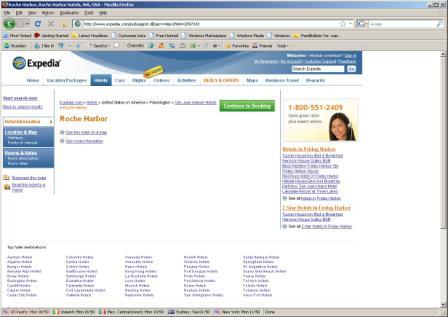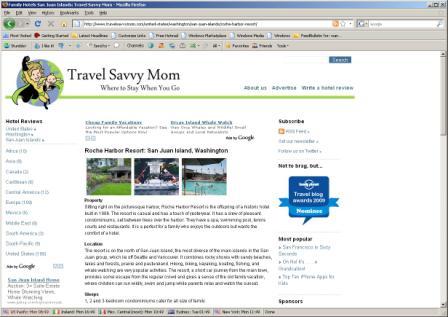Earlier this month, I attended a travel industry networking event hosted by NerdsEyeView and Yapta.com here in Seattle. This event, the inaugural meeting of SCOOT far exceeded my initial expectations. What I thought was going to be a purely social meet-and-greet event was instead an in-depth discussion of the state of the online travel industry with a question-and-answer session moderated by Harriet Baskas of MSNBC.com’s “Well-Mannered Traveler”. Panel members included representatives from Alaska Airlines, Expedia.com, Farecast.live.com, Escapia.com, Google and Yapta.com.During the discussion, I heard the panelists repeat two phrases a number of times:
1. Providing “the Amazon.com experience” for customers using online travel agencies.
2. An acknowledgement that travel bloggers provide much better on-the-ground information for travelers than that offered by these websites.
What was meant by the reference to Amazon.com was never fully articulated, but as I listened to the rest of the discussion, I started thinking of what this could mean in terms of information available to me as a frequent user of online travel agency websites. Thus intrigued, during the audience Q&A, I asked the panel what their ideas were on how best to integrate blogger-provided information on their websites. Although each panelist considered the question thoughtfully and answered intelligently, no-one provided any ideas which excited me in any way. In fact, I walked away thinking that the industry participants didn’t quite “get” the ideas which were already buzzing in my head.
Disclaimer: I worked at Amazon.com for eight years and have thought about the structure, content and applications on an Amazon.com detail page probably more than most people on this planet – except, perhaps for the people I know who are still working there 
A Blog Content Example
One of the most difficult things about planning and booking travel independently is finding accommodation which meets the buyer’s criteria for price, space, budget and quality. Providing better information on accommodation products is one example where I see an opportunity for integration between online travel agency websites and bloggers.
For an example, let’s review the information available for a small, independent hotel on Expedia.com as compared to the same hotel on a family travel blog. Let’s then consider how the different data could be integrated.
As my example I chose the Roche Harbor Resort, in Friday Harbor, for no reason other than that I’d had a really enjoyable weekend there a number of years ago when both my children were very little and it transpires that it fit the criteria perfectly. The goal of this experiment is to show that if an online travel agency were to integrate blogger information for properties such as the Roche Harbor Resort, this has the potential to provide significant benefit to their customers thereby increasing customer fealty and also increasing the probability of customer conversion – from window-shopper to purchaser of a travel product on that website (or “looker to booker” in online retail parlance).
Blog content providing detailed first-hand information about a property is generally superior to the information available on an online travel agency website since most travel bloggers aim to build loyal readers by sharing their experiences as a service to their readers.
The Expedia listing for this hotel is very sparse. By contrast, it took me all of two minutes searching on Google to find a thorough review of the property on TravelSavvyMom. Interestingly, the information on TripAdvisor (an Expedia subsidiary) for this hotel is much richer, but I find the TripAdvisor interface too busy to be useful – there’s too much on the page, especially if I’m researching a travel product such as a hotel and there is always the question of the quality of the reviews.
Integrating Blog Content
To recap, the detail page for the example hotel on the example online travel agency had very little information and I was able to find much more detailed information on a reputable travel blog very quickly. If I were the owner of the online travel agency platform, could I integrate blog-generated content inexpensively to provide added value to my customers? I think this is possible. If a ‘Blogged About’ information tab was added to the hotel detail page, using RSS feeds and a Google Search Appliance (or similar device) blog-sourced content about the hotel could be automatically added to the page. However, this model could end up being expensive to the online travel website in that the quality of blog-sourced content would have to be verified manually on a continual basis for millions of travel products.
Consider instead the model provided by the AmazonConnect service on Amazon.com. This service provides authors a way of interacting directly with readers and creating additional content on the detail pages of their books. Authors self-select to participate in this service and must have their identity verified independently – by the publisher or distributor – before any content generated on an Amazon.com-hosted blog or an externally-hosted blog is shown on the book detail page. For example, I can read information about James Patterson as provided by his publisher and on the detail pages for his books there are standard editorial reviews and posts from his blog – published via RSS. This is a model which online travel websites should consider for integrating blog content.
Key Features Of A Shared Content Program
Bloggers who are interested in participating in such a program could apply for membership. Suppliers, their agents and the online travel company could participate in the process to approve a blogger – including a quality review of material supplied by the blogger. RSS could be used as the content delivery mechanism. Searching or filtering of content would be necessary to direct only relevant posts to particular detail pages, but this could be done simply using content tagging. For the program to provide the best benefit for the travel agency customers, the user should be able to filter the categories of blog content which they are interested in seeing – for example, I am interested in family travel but not luxury travel. The addition to the blog content, providing independent reviews of a property from sources which are not affiliated with the supplier or the online travel agency, can only increase the customer’s trust in the information provided.
Benefits Of Sharing Content To The Blogger
You might ask why would a blogger be interested in such a program? Well, that would, of course, depend on the structure of the program but as a thought-experiment it seems to me that either potential increased traffic (from online travel agency websites to the blog) or a financial relationship such as the Amazon.com Associates program could provide incentives for the blogger.
In Summary…
I’m really glad I attended the SCOOT event, it gave me a good two weeks of percolating this idea which I’m excited to share out to readers of this blog, travel-blogging friends and now, the members of the online travel industry who I met at the event. Personally, I think this is a kick-ass idea and I’d be happy to discuss implementation details with anyone who’s interested. The online travel industry – search engines, agencies and supplier websites – excel in providing tools for customers to find and purchase travel products. Bloggers excel at providing in-depth content about those products. It’s about time someone found a better way to marry those two areas of expertise.



